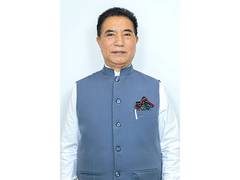SC laments dismissal of Christian man’s plea seeking burial of his deceased father in native village
New Delhi [India], January 20 (ANI): The Supreme Court on Monday expressed its displeasure over the dismissal of a Christian man’s plea seeking permission to bury his deceased father’s body in his family’s native village by the Chhattisgarh High Court.
A bench of justices, BV Nagarathna and Satish Chandra Sharma, lamented that the body of the deceased person had been lying in a mortuary for the last 12 days, without any resolution being provided from either the state authorities or the high court.
The Court stated that it was pained by the fact that a person has to move the Supreme Court for the burial of his father.
Further, the Court asked the State respondents as to what the position all this while was regarding such burials in the village.
“What was the position all these decades? Why is this objection being raised only now?” the top court judge asked.
During the hearing, the Court asked the parties whether there was any resolution to the sorry state of affairs concerning the deceased’s body lying in the mortuary since January 7.
The top court was hearing Chhattisgarh’s response to a plea filed by a Christian man, Ramesh Baghel, who had challenged Chhattisgarh High Court’s decision having denied him permission to bury his deceased father according to his family’s religious rituals in his resident village.
The High Court had in its order said that if Baghel (petitioner) is granted permission to bury his deceased father in his resident village’s common burial area, it would cause a law and order problem as the villagers had raised objections regarding the same.
The Court had said that a separate burial area for Christians was available in a nearby village situated at a distance of 20-25 kilometres away from the petitioner’s village.
When the case came up at the Supreme Court today, the Solicitor General of India (SG), Tushar Mehta, who appeared for Chhattisgarh, submitted that the burial ground in question is designated for the Hindu tribal community and not for the Christians.
On being asked by the Court as to why the petitioner’s father cannot be buried in their private land as had been sought by the petitioners, SG Mehta said that the same is prohibited under the law.
“all over the country there are designated cremation places and burial places… once you bury someone, the character of the land changes; it becomes sacred and has health issues”, SG Mehta said.
Justice Nagarathna was not pleased with the SG’s submissions.
“The third day after cremation, nothing remains. burial of persons is permitted in their land”, the judge stated.
SG Mehta told the court that the petitioner’s plea was not intended to protect the interest of just one person (the petitioner).
“It’s the beginning of something more,” Mehta said.
Further, it was submitted by the State that there are designated areas for the burial, which is about 20 km away from the village in question.
The court was told that all Christians belonging to the petitioner’s village carry out their burial activities in the aforesaid village which is at a distance of 20 km.
On the other hand, Senior Advocate Colin Gonsalves, who appeared for the petitioner, countered SG Mehta’s (States’) submissions by contending that the State is trying to break with the tradition of secularism that had been followed in the village for a long.
He took the Court through photographs of the graves of the other deceased members of the petitioner’s family who had been buried in the common burial area situated in the village in question.
The senior counsel categorically showed the court that there were crosses (depicting the Christian symbol) over those graves.
At this juncture, a heated exchange took place between SG Mehta and Senior Advocate Gonsalves.
The court listed the matter to be heard next on Wednesday, at SG Mehta’s request, after he said that he would file a better counter-reply to the petitioner’s plea.






